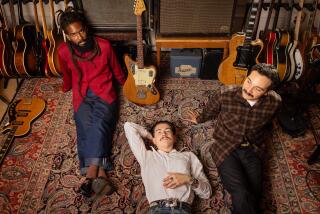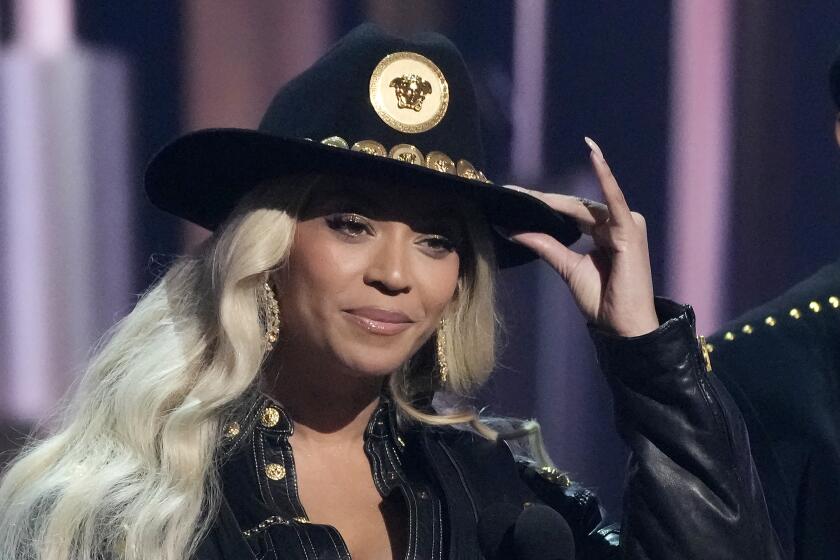Seeking a Path After ‘Tha Crossroads’
It’s been a heady couple of weeks for Bone Thugs-N-Harmony. The Cleveland rap group’s “Tha Crossroads” became the highest-debuting rap single ever when it entered the national singles chart at No. 2 six weeks ago, and it has continued to sell in the 200,000 range every week. Its popularity helped put the album it comes from, “E. 1999 Eternal,” back into the nation’s Top 10 nearly a year after its release.
Though there’s plenty to celebrate, the mood is surprisingly subdued as the quintet holes up in a Hollywood studio to work on its third album. And the reason isn’t hard to figure out: The death last year of the group’s mentor, rapper Eazy-E, makes the current victory a bittersweet one.
It was Eazy, they say, who gave them their shot out of poverty, and it was Eazy who taught them how to make a living away from the streets.
“When we found him, we found our way out,” says Wish Bone, who, like the other members of the group, never reveals his birth name or age. “Then he died right before [the success] happened, and it seemed like we were gonna be left in the streets right back where we came from.”
During a break from the recording, Wish sits with his cousin and bandmate Layzie Bone at a tiny wooden table in the studio’s lounge area. The stocky rapper is reflecting on the success of “Tha Crossroads,” whose lyrics and video imagery offer an emotional pastiche of funeral scenes, cemeteries and an angel of death modeled after a ghetto hustler.
“It’s something everybody in the world can relate to,” Wish says. “No matter who you are, where you live, what you do for a living, there’s two things to look forward to: death and taxes.”
The current hit, a slight remix of a song that was written before Eazy-E, 31, died of complications of AIDS in March last year, took on an even more profound meaning for the group after his death.
“It’s still hard for me to accept his passing,” says Layzie, whose right arm has a tattoo of two hands clasped in prayer, while his left forearm bears the inscription “Eazy-E, R.I.P.” “We wouldn’t be having this conversation without him.”
The ties to the West Coast rapper, whose real name was Eric Wright, are understandably strong. Back in 1993, after growing up on welfare and making a living selling drugs, Layzie and Wish rounded up their colleagues Krayzie Bone, Bizzy Bone and Layzie’s brother Flesh-N-Bone and boarded a bus to Los Angeles.
Although they had no demo tape to present and no concrete plan of attack, they were certain their soulful harmonizing and hard-hitting rhymes--honed on junior high playgrounds and later in the streets of Cleveland--would gain them recognition.
But the group, whose members appear to be in their early 20s, spent the next couple of months on L.A.’s streets as they attempted to make contact with Eazy--a founding member of N.W.A., a successful solo artist and the owner of the Ruthless Records label.
“We knew he was the man,” Wish says. “The music of N.W.A. was the first time we heard anybody rapping about how we were living. He was telling our stories, and we trusted him.”
The closest they got to Eazy, however, was a phone interview in which the members took turns rapping in his ear. Then Eazy told them he was leaving shortly to do a show in, of all places, Cleveland.
Back on the bus they went, this time determined not to miss him in person. They got their audition backstage at his concert, and Eazy quickly signed them to Ruthless. He was the executive producer of Bone Thugs-N-Harmony’s 1994 debut, the multi-platinum EP “Creepin on Ah Come Up,” which put Cleveland on the rap map.
“1st of Tha Month,” the first hit off the second album, the 3-million-selling “E. 1999 Eternal”--which Eazy also executive-produced--fuses the rappers’ silky, five-part harmonies with rapid-fire rap dialogue in a celebration of the day the welfare checks arrive.
It’s clear that the music is designed not to push hot buttons but simply to reflect their upbringing.
“We all came up together and it gave us something [special],” Wish says of the band’s music. “Most of our worst experiences of our life and our best experiences, one of us was with each other, and you can hear it in our music. It’s real.”
“Tha Crossroads,” with its soft, prayerful tone, only reinforces that impression.
“Since our career started off, a lot of people around us and people close to us died,” Wish says. “So we had to do something strong for all the lost souls.”
More to Read
The biggest entertainment stories
Get our big stories about Hollywood, film, television, music, arts, culture and more right in your inbox as soon as they publish.
You may occasionally receive promotional content from the Los Angeles Times.










